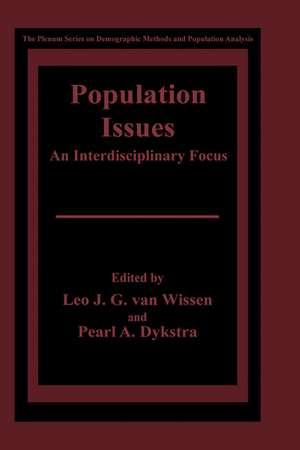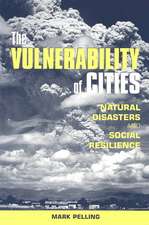Population Issues: An Interdisciplinary Focus: The Springer Series on Demographic Methods and Population Analysis
Editat de Leo J.G. van Wissen, Pearl A. Dykstraen Limba Engleză Hardback – 31 aug 1999
| Toate formatele și edițiile | Preț | Express |
|---|---|---|
| Paperback (1) | 999.60 lei 6-8 săpt. | |
| SPRINGER NETHERLANDS – 27 sep 2012 | 999.60 lei 6-8 săpt. | |
| Hardback (1) | 951.14 lei 6-8 săpt. | |
| SPRINGER NETHERLANDS – 31 aug 1999 | 951.14 lei 6-8 săpt. |
Din seria The Springer Series on Demographic Methods and Population Analysis
- 15%
 Preț: 643.99 lei
Preț: 643.99 lei - 15%
 Preț: 643.16 lei
Preț: 643.16 lei - 18%
 Preț: 955.56 lei
Preț: 955.56 lei - 18%
 Preț: 952.40 lei
Preț: 952.40 lei -
 Preț: 393.90 lei
Preț: 393.90 lei -
 Preț: 393.74 lei
Preț: 393.74 lei - 15%
 Preț: 639.08 lei
Preț: 639.08 lei - 18%
 Preț: 952.89 lei
Preț: 952.89 lei - 18%
 Preț: 1118.45 lei
Preț: 1118.45 lei -
 Preț: 402.17 lei
Preț: 402.17 lei - 18%
 Preț: 953.82 lei
Preț: 953.82 lei - 15%
 Preț: 644.30 lei
Preț: 644.30 lei - 15%
 Preț: 663.93 lei
Preț: 663.93 lei - 18%
 Preț: 1380.95 lei
Preț: 1380.95 lei - 18%
 Preț: 953.65 lei
Preț: 953.65 lei - 18%
 Preț: 949.42 lei
Preț: 949.42 lei - 15%
 Preț: 644.82 lei
Preț: 644.82 lei - 18%
 Preț: 953.03 lei
Preț: 953.03 lei - 18%
 Preț: 952.09 lei
Preț: 952.09 lei - 15%
 Preț: 643.65 lei
Preț: 643.65 lei - 15%
 Preț: 643.99 lei
Preț: 643.99 lei - 15%
 Preț: 644.82 lei
Preț: 644.82 lei - 15%
 Preț: 642.51 lei
Preț: 642.51 lei - 15%
 Preț: 644.95 lei
Preț: 644.95 lei - 15%
 Preț: 641.20 lei
Preț: 641.20 lei
Preț: 951.14 lei
Preț vechi: 1159.94 lei
-18% Nou
Puncte Express: 1427
Preț estimativ în valută:
182.01€ • 188.05$ • 151.41£
182.01€ • 188.05$ • 151.41£
Carte tipărită la comandă
Livrare economică 19 martie-02 aprilie
Preluare comenzi: 021 569.72.76
Specificații
ISBN-13: 9780306461965
ISBN-10: 030646196X
Pagini: 308
Ilustrații: XV, 287 p.
Dimensiuni: 155 x 235 x 22 mm
Greutate: 0.61 kg
Ediția:1999
Editura: SPRINGER NETHERLANDS
Colecția Springer
Seria The Springer Series on Demographic Methods and Population Analysis
Locul publicării:Dordrecht, Netherlands
ISBN-10: 030646196X
Pagini: 308
Ilustrații: XV, 287 p.
Dimensiuni: 155 x 235 x 22 mm
Greutate: 0.61 kg
Ediția:1999
Editura: SPRINGER NETHERLANDS
Colecția Springer
Seria The Springer Series on Demographic Methods and Population Analysis
Locul publicării:Dordrecht, Netherlands
Public țintă
ResearchCuprins
1. Introduction: The Life Course Approach as an Interdisciplinary Framework for Population Studies.- 1.1. Demography as an “Object” Science.- 1.2. The Life Course Approach.- 1.3. Overview of Chapters.- 2. The Life Course: Models and Analysis.- 2.1. Introduction.- 2.2. The Life Course: A Paradigm Shift.- 2.3. Anatomy of the Life Course.- 2.4. Life Histories Analysis: Variables, Data and Models.- 2.5. Conclusion.- 3. From Youth to Adulthood: Understanding Changing Patterns of Family Formation from a Life Course Perspective.- 3.1. Introduction.- 3.2. Changes in Family-Life Transitions: The Dutch Case.- 3.3. Major Recent Developments in Studies on the Transition from Youth to Adulthood.- 3.4. Societal Changes Influencing the Transition from Youth to Adulthood.- 3.5. Dynamic Studies of the Individual-Level Determinants of Family-Life Decisions.- 3.6. Opening the “Black Box”: Studies on Individual Decision-Making Process.- 3.7. Features of the Future: How Will Studies on the Transition from Youth to Adulthood Evolve?.- 4. Households, Families, and Kin Networks.- 4.1. Introduction.- 4.2. Changing Household and Family Structures in Present-Day Europe.- 4.3. Young Families and the Aging of Fertility.- 4.4. Changing Kin Networks.- 4.5. Social Networks of the Elderly.- 4.6. Conclusion.- 5. Work, Savings, and Social Security in a Life Course Perspective.- 5.1. Introduction.- 5.2. Transitions in the Labor Market.- 5.3. Savings over the Course of a Life Time.- 5.4. Social Security over the Source of a Life Time.- 5.5. Sustainability of Social Security.- 5.6. Conclusions.- 6. Residential Relocations in the Life Course.- 6.1. Introduction.- 6.2. A Life Course Theory of Residential Relocations.- 6.3. Processes Underlying the Decision to Move.- 6.4. Who Moves Under WhichCircumstances.- 6.5. Household Formation: Leaving the Parental Home.- 6.6. Residential Environments.- 6.7. Renting and Owning.- 6.8. The Consequences of Migration for Labor Market Careers.- 6.9. Conclusion.- 7. Medical Demography in the Netherlands: Recent Advances, Future Challenges.- 7.1. Introduction.- 7.2. Challenges for Medical Demography.- 7.3. Studies on Past Trends in Mortality.- 7.4. Studies on Mortality Differentials Between Population Groups.- 7.5. Studies on Future Trends in Mortality.- 7.6. Studies on Future Trends in Morbidity.- 7.7. Studies on Consequences for Health Care Demand, Costs and Financing.- 7.8. Policy Relevance.- 7.9. Challenges to Future Research.- 8. Advances in the Microsimulation of Demographic Behavior.- 8.1. Introduction.- 8.2. Theory: Micro Biographies and Macro Structures.- 8.3. Microsimulation Methodology.- 8.4. State of the Art: Microsimulation Models in the Priority Program.- 8.5. Conclusion.- 9. Epilogue: New Directions in Population Studies.- 9.1. Introduction.- 9.2. Accomplishments and Challenges.- 9.3. The Life Course: A Useful Interdisciplinary Framework.














